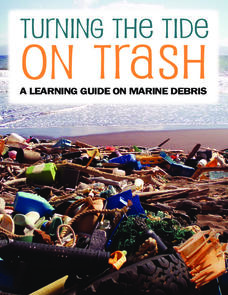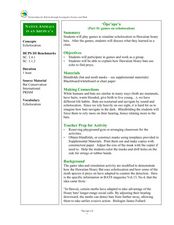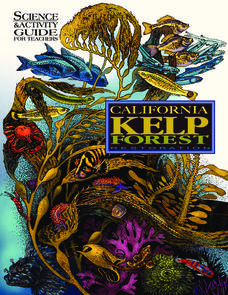National Science Teachers Association
Hop into Action
Young scientists find out what makes amphibians such unique and interesting animals in this simple life science lesson. After looking at pictures and discussing the characteristics of amphibians, learners complete a series of three Venn...
NOAA
Turning the Tide on Trash: A Learning Guide on Marine Debris
The lessons in this learning guide are designed to increase youngsters' awareness of the impacts of marine debris and to teach them about pollution prevention techniques. This fabulous, 30-page packet is chock full of important...
Berkshire Museum
The Three Life-Giving Sisters: Plant Cultivation and Mohican Innovation
Children gain first-hand experience with Native American agriculture while investigating the life cycle of plants with this engaging experiment. Focusing on what the natives called the Three Sisters - corn, beans, and squash - young...
Curated OER
Games on Echolocation
Get a little batty with life science! This fun simulation game replicates how bats use echolocation to hunt moths in their native Hawaiian habitat. After creating blind folds and discussing some basic principles of echolocation, students...
NOAA
An Ocean of Energy
Young biologists trace the path of the sun's energy through marine ecosystems in the second part of this four-lesson series. Building on prior knowledge about producers, consumers, and decomposers students are introduced to the concept...
NOAA
Understanding Food Chains and Food Webs
Jump into an exploration of marine ecosystems with the first lesson in this four-part series. After first learning about crustaceans, mollusks, and other forms of sea life, young marine biologists view a PowerPoint presentation that...
Baylor College
Lungometer
Life science learners construct lung-o-meters from gallon-sized milk jugs and then measure their lung capacities. For older students, have them graph the vital lung capacities of each person in the class. Cross-curricular pieces are...
National Wildlife Federation
Massive Migrations
Turn your students into flocks of migratory birds for this fun lesson on animal migration. Prior to the activity, the teacher creates four different migration routes in the classroom or any available open space, labeling nesting...
Berkshire Museum
Meet a Naturalist: Researching, Writing, Interviewing
Young scholars reach out into the community and learn about different environmental science careers in this inquiry-based instructional activity. Beginning with a short research assignment, children gain background knowledge about...
Baylor College
Energy for Life (Energy from Food)
Energy comes in many forms, but how do living things get the energy they need to survive and thrive? In a simple, controlled experiment with yeast, water, and sugar, groups make observations about how yeast reacts with water alone, then...
NOAA
Seafood and Human Health
Whether your young biologists realize it or not, humans play a significant role in marine ecosystems. To help them understand this fact children first create graphical representations that show homo sapiens' place in marine food chains,...
Curated OER
Whale Song Acrostic
What do whales sing about? Invite your class to imagine the thoughts of whales before writing acrostic poems on the topic. The plan blends together a bit of life science with plenty of opportunities for creativity and writing.
Education Outside
Plant, This Is Your Life!
Individuals select a plant, illustrate it in their journal, record observations, and create a life story for their plant that accounts for its features and any unique properties. Using these descriptions, a partner attempts to locate...
American Forest Foundation
Who Speaks for the Trees?
Help young conservationists appreciate the important role that trees play in ecosystems around the world with this collection of six engaging activities. From a shared reading and class discussion of Dr. Seuss' The Lorax, to in an depth...
Science Matters
Blubber Gloves: It’s All About Insulation
Instill the concept of adaptation with the help of Blubber Gloves—ziplock bags, shortening, and duct tape. Scholars discuss how animals and plants keep warm in polar regions, record their predictions, and try on their Blubber Gloves to...
Berkshire Museum
Adopt a Schoolyard Tree
Help young scientists connect with nature and learn about trees with a fun life science lesson. Heading out into the school yard, children choose a tree to adopt, taking measurements, writing descriptions, and drawing sketches of it in...
Conserve Wildlife Foundation of New Jersey
The Great Peregrine Scavenger Hunt - On the Internet
The story of one bird provides valuable insight into general animal behaviors and interactions. Young researchers investigate the peregrine falcon using a web search. They analyze the behaviors of the raptor including its migration...
Curated OER
Growing Penguins
A collection of photos and accompanying descriptions describing the life cycle of an Adelie penguin is the highlight of this resource. Working in groups, polar explorers match the descriptions to the pictures and create a timeline. An...
Dawn N . Ericson
California Kelp Forest Restoration
This unit is so cool, you won't be able to "kelp" yourself! Intended for all grades, this science and activity guide for teachers offers a unique opportunity to understand kelp's role as a valuable ecological resource. Teachers and...
Curated OER
The Marvels of Mud
Young scientists roll up their sleeves and get a little dirty in this three-day earth science investigation. Following the scientific method, children monitor the growth of algae in pond water samples in order to determine the role that...
National Wildlife Federation
What's Your Habitat?
How are third graders like rabbits? They both live in habitats and require food, water, and shelter to survive! An educational science lesson encourages your learners to think about their own habitats and survival needs, before comparing...
Curated OER
Classifying Plants and Insects
Art and science come together in a lesson based on Flower Still Life by Ambrosius Bosschaert the Elder. Learners classify plants and insects in the painting by color, leaf shape, size, reproduction, and season of bloom.
Sea World
Endangered Species
Study different endangered species with several activities that incorporate math, science, language arts, and research strategies. A great addition to your lesson on conservation or Earth Day.
National Park Service
Living & Non-Living Interactions
What better way to learn about ecosystems than by getting outside and observing them first hand? Accompanying a field trip to a local park or outdoor space, this series of collaborative activities engages children in learning about the...
Other popular searches
- 4th Grade Life Science
- Life Science Inquiry
- Life Science Vertebrates
- Life Science Experiments
- K 2 Life Science
- Life Science on Cells
- Life Science Lesson Plans
- Grade 4 Life Science
- Life Science Report Topic
- Australia Life Science
- The Life Science
- Life Science Lessons

























